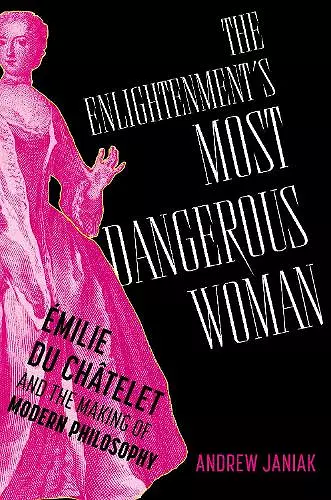The Enlightenment's Most Dangerous Woman
Émilie du Châtelet and the Making of Modern Philosophy
Format:Hardback
Publisher:Oxford University Press Inc
Published:16th Jan '25
Should be back in stock very soon

Suppressed for centuries, the ideas of French philosopher Émilie Du Châtelet are ever relevant today... Just as the Enlightenment was gaining momentum throughout Europe, philosopher Émilie Du Châtelet broke through the many barriers facing women at the time and published a major philosophical treatise in French. Within a few short years, she became famous: she was read and debated from Russia to Prussia, from Switzerland to England, from up north in Sweden to down south in Italy. This was not just remarkable because she was a woman, but because of the substance of her contributions. While the men in her milieu like Voltaire and Kant sought disciples to promote their ideas, Du Châtelet promoted intellectual autonomy. She counselled her readers to read the classics, but never to become a follower of another's ideas. Her proclamation that a true philosopher must remain an independent thinker, rather than a disciple of some supposedly “great man” like Isaac Newton or René Descartes, posed a threat to an emerging consensus in the Enlightenment. And that made her dangerous. After all, if young women took Du Châtelet's advice to heart, if they insisted on thinking for themselves, they might demand a proper education--the exclusion of women from the colleges and academies of Europe might finally end. And if young women thought for themselves, rather than listening to the ideas of the men around them, that might rupture the gender-based social order itself. Because of the threat that she posed, the men who created the modern philosophy canon eventually wrote Du Châtelet out of their official histories. After she achieved immense fame in the middle of the eighteenth century, her ideas were later suppressed, or attributed to the men around her. For generations afterwards, she was forgotten. Now we can hear her voice anew when we need her more than ever. Her lessons of intellectual independence and her rejection of hero worship remain ever relevant today.
[a] lucid biography * Michael Prodger, New Statesman *
...engrossing * The New Yorker *
By setting his detailed analysis of her major work, Institutions de physique, against discussions of early modern scientific and philosophical controversies, Janiak provides a lucid and thoroughly persuasive account of Du Châtelet's originality and her influence on Enlightenment thought. The book asks a powerful question: how did it happen that "the most famous woman of the Enlightenment," whose ideas were echoed by thinkers across Europe was so thoroughly erased from histories of philosophy? Without ever losing sight of Du Châtelet and her philosophical vision, Janiak illuminates the blind spots and biases within the discipline of philosophy from the eighteenth century to the present. * Julie Candler Hayes, University of Massachusetts Amherst, author of Women Moralists in Early Modern France *
Janiak offers readers clear, accessible descriptions of Du Châtelet's significant contributions to the philosophers' and physicists' arguments in the early decades of the Enlightenment. His book makes a useful addition to the literature on this amazing genius and this key era in the evolution of our modern philosophical and scientific approaches to our universe. * Judith P. Zinsser, author Emilie Du Chatelet: Daring Genius of the Enlightenment *
Although she was recognised in her own time as France's premier female philosophe, Emilie Du Châtelet's star was subsequently obscured by the shadows of Newton, Leibniz, Voltaire, and other 'great men' of the Enlightenment. Until recently, she only attracted interest for her liaison with Voltaire. Janiak's study places her where she deserves to be, as a major female thinker of the Enlightenment. It is refreshing to read an account which discusses her as a thinker in her own right. Focusing on her masterwork, Institutions de physique, he navigates the complexities of her scientific and philosophical context to explain the importance of Du Châtelet's achievement for the history of science and philosophy. This is a masterly account, which will be appreciated by non-specialists as well as readers familiar with her work. * Sarah Hutton, Honorary Visiting Professor, University of York, UK *
This is generally a great book to browse through for inspiration...the available information, these authors have crafted a great scholarly book, though it is occasionally too digressive or philosophical. This book is suitable for purchase by academic libraries, as there will be some students in most schools who are interested in such reflections. * Pennsylvania Literary Journal *
In The Enlightenment's Most Dangerous Woman, Andrew Janiak, a professor of philosophy at Duke University, challenges the way Du Châtelet is remembered today. His emphasis is philosophical rather than biographical and his fundamental argument is that Du Châtelet has been unjustly excluded from the canon of Enlightenment philosophers, her contributions ignored or subsumed into the works of the 'great men' that the canon was established to celebrate. * The Wall Street Journal *
"...engrossing" * The New Yorker *
Janiak writes warmly about Du Chatelet's work ... Du Chatelet certainly deserves the reassessment she is now receiving. * Sarah Bakewell, The SpectatorThe SpectatorThe Spectator *
Janiak's detailed, thought-provoking book presents another step towards the restoration of du Châtelet to her rightful place in the history of philosophy...[it excels] in its discussion of its subject's intellectual and philosophical context, and in the nuanced lessons it draws from history for present-day du Châtelet scholars. * Geertje Bol, Times Literary Supplement *
ISBN: 9780197757987
Dimensions: 216mm x 147mm x 33mm
Weight: 476g
304 pages